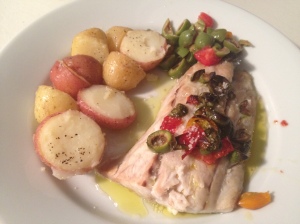The reading for my summer “City Life in Fact and Fiction” class at New York University’s School of Continuing and Professional Studies included a short story and short novel by Joseph Mitchell. Both “Up in the Old Hotel” and “Old Mr. Flood” are set in the Fulton Fish Market, which closed shortly after I moved to New York City. I am sorry I never made it to the market in 2005, just to see what it looked like (though I understand the market had seen its height long before my parents were even born).
The Hartford Hotel setting reminds me of an evening I never experienced at the end of my first ride on the Coast Starlight, Amtrak’s Los Angeles-to-Seattle route. I was travelling alone on a North American Rail Pass in December of 2000. Vancouver, Jasper, Winnipeg, Toronto and Chicago were on my itinerary, after a short stay in Seattle. My plan was to stay at a hostel in downtown Seattle, but a heavy, middle-aged Montana man I met on the train almost convinced me to go with him to Ballard, a neighborhood of Seattle on the Puget Sound’s Shilshole Bay. He invited me to hang out at a bar that would likely be filled with old fishermen.
Looking back, I imagine the bar probably looked like Montero’s in Brooklyn Heights must have looked 40 years ago. I was almost sold, but decided against going to this strange neighborhood with a strange person. I stuck to my downtown Seattle plan.
But back to “Old Mr. Flood.” The title character believes fish is an elixir that will enable him to live to 115. His description of food reads like something that could have been written in the 21st Century. My favorite passage:
“Fish,” he says, “is the only grub left that the scientists haven’t been able to get their hands on and improve. The flounder you eat today hasn’t got any more damned vitamins in it than the flounder your great-great-grandaddy ate, and it tastes the same. Everything else has been improved and improved and improved to such an extent that it ain’t fit to eat. Consider the egg. When I was a boy on Staten Island, hens ate grit and grasshoppers and scraps from the table and whatever they could scratch out of the ground, and a platter of scrambled eggs was a delight. Then the scientists developed a special egg-laying mash made of old corncobs and sterilized buttermilk, and nowadays you order scrambled eggs and you get a platter of yellow glue.
Now ever since starting these stories, I have been eating fish nonstop. In one evening at the Jersey Shore, I ate 9 oysters, 6 clams, 6 shrimp and a 1.25-pound lobster. Today, my lunch was a fried haddock sandwich from Marino’s Fine Foods in Springfield, N.J. Yesterday’s lunch was canned cayenne-spiked sardines on a roll (healthy and sustainable!). Two Saturdays ago, I bought sea trout from the fishmonger at the farmers’ market in Staten Island (I told him about Joseph Mitchell and paraphrased the passage quoted above).
If only New York City still had fish restaurants like those Joseph Mitchell writes about. Sloppy Louie’s, Sweet’s and Libby’s, Gage & Tollners and Lundy’s are all, sadly, closed. Thankfully, we have plenty of fish markets around, as well as some great seafood spots in Astoria.
The sea trout below was from the farmer’s market was excellent, broiled simply with olive oil, sea salt and some diced olives and tomatoes.
